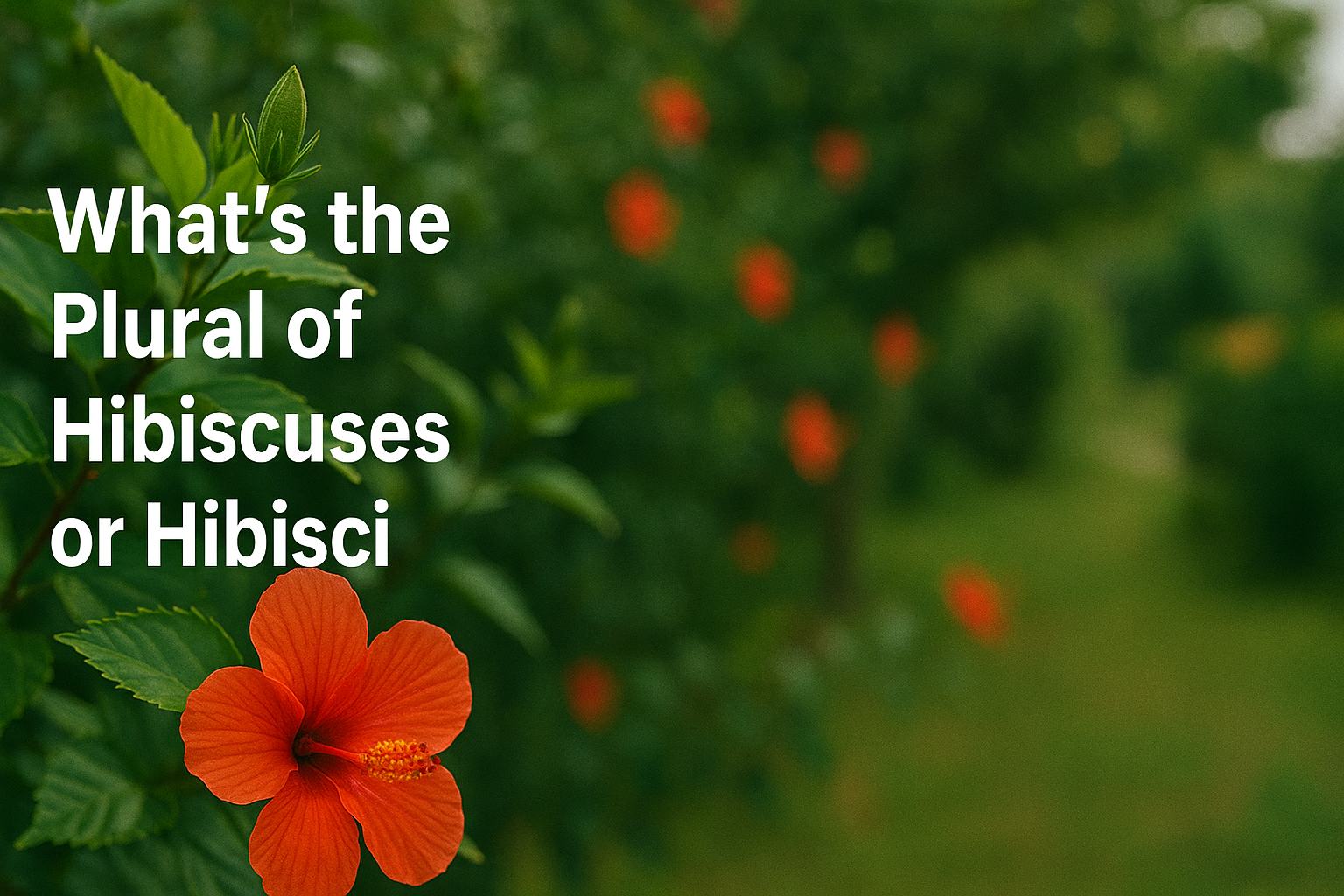When gardeners, writers, or botanists ask about the plural of hibiscus, they often wonder: should it be hibiscuses, hibisci, or something else entirely? The answer depends on the context. Let’s dive into the grammar, usage, and real-world examples to clarify.
Understanding Hibiscus — Singular and Plural Form
A hibiscus refers to a tropical flowering plant loved for its colorful blossoms. When you talk about one plant, use hibiscus.
When referring to more than one, you have two options:
- Hibiscuses (standard English plural adding ‑es)
- Hibisci (Latin-derived plural form)
Both are technically correct, but one might feel more natural depending on your setting.
Read More About This Article: Plural of Bacterium: Is It Bacteria or Bacteriums?
Standard English Pluralization Rules
In everyday English plural rules, most nouns ending in “‑us” form their plurals by adding “‑es.” You get:
- cactus → cactuses (also cacti)
- focus → focuses
- fungus → funguses (also fungi)
Following that standard pluralization pattern, hibiscuses fits perfectly into regular English.
Latin Influences: Why Hibisci Still Works
The Latin plural tradition remains strong in scientific and botanical writing. Many Latin nouns ending with ‑us take ‑i in plural. Examples include:
| Latin Singular | Latin Plural |
|---|---|
| cact(us) | cact(i) |
| bacteri(us) | bacteri(a) |
| hibisc(us) | hibisc(i) |
While hibisci sounds unusual in everyday speech, it shows up in formal botanical contexts—especially when Latin naming conventions apply.
Botanical Usage: When Hibisci Fits Best
Latin-derived plural form is common when naming varieties or species of hibiscus. For instance:
“Ten hibisci of different species were planted for testing.”
In botanical journals or plant taxonomy, using hibisci aligns with scientific precision. It honors the Latin system behind biological classification.
Everyday English Usage: Why Hibiscuses Is More Common
Most English speakers, gardeners, and writers prefer hibiscuses:
- It follows predictable English grammar
- It’s listed first in dictionaries like Cambridge and Merriam‑Webster
- It reads smoothly in casual writing and conversation
Example sentence:
“She grows three red hibiscuses along her patio.”
Choosing Based on Context
Whether to use hibiscuses or hibisci depends on your audience:
| Context | Preferred Plural | Why |
|---|---|---|
| Garden blogs | hibiscuses | Reader familiarity |
| Scientific articles | hibisci | Botanical naming conventions |
| Academic essays | hibiscuses | Standard grammar works best |
| Latin studies | hibisci | Consistent with Latin rules |
If in doubt, hibiscuses is the safe and reader-friendly choice.
Similar Words with Dual Plurals
English often offers both Latin and English-style plurals:
- cactuses / cacti
- funguses / fungi
- syllabuses / syllabi
This flexibility lets writers choose based on tone and audience without sacrificing correctness.
Examples in Real Sentences Using Both Forms
- Everyday English: “The bright hibiscuses in her garden attract hummingbirds.”
- Botanical Journal: “The researchers catalogued five hibisci in the greenhouse.”
- Conversational: “Have you seen the new hibiscuses at the local nursery?”
These show how each plural form fits naturally in different contexts.
Dictionary and Style Guide Recommendations
Leading dictionaries back up these plural forms:
- Merriam‑Webster stands firmly behind hibiscuses as the standard plural.
- Oxford English Dictionary also lists hibiscuses first, marking hibisci as less common or specialized.
Style guides generally encourage using hibiscuses unless writing in a strict botanical or Latin-based context.
Final Recommendation
- Use hibiscuses for general writing, blogs, and casual contexts
- Use hibisci when writing scientifically or referencing Latin taxonomy
- You can’t go wrong with hibiscuses in everyday writing—it’s widely understood and reader-friendly
Remember this simple rule: One hibiscus → multiple hibiscuses (unless the Latin context demands hibisci).
Quick FAQ on Plural of Hibiscus
Is hibiscus singular or plural?
- Hibiscus is singular.
Is hibiscuses correct?
- Yes, it’s the standard English plural.
Can I say hibisci?
- Yes, but mostly in formal botanical or Latin-related writing.
Which plural is safest for everyday use?
- Hibiscuses is universally safe and accepted.
Plural Forms Cheat Sheet
| Singular | English Plural | Latin Plural | Notes |
|---|---|---|---|
| hibiscus | hibiscuses | hibisci | Use depending on context |
| cactus | cactuses | cacti | Similar dual plural example |
| fungus | funguses | fungi | Common Latin vs English variation |
Why This Matters
Choosing between hibiscuses and hibisci isn’t just about being grammatically correct. It’s about clarity and respecting your audience. English grammar lets you enjoy flexibility—but knowing when to use which form ensures your writing stays precise and credible.
Whether you’re writing for gardeners, scientists, or your local plant society, you now know exactly which plural to use—and why.

